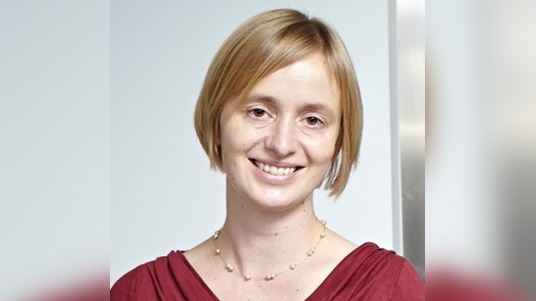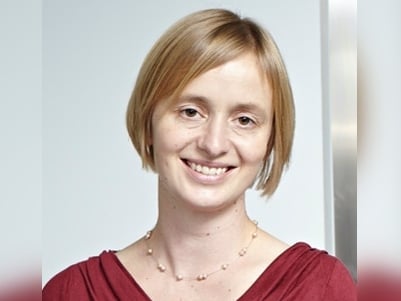
Image: Dr Sally George, leader of the Developmental Oncology group at the ICR
Every day of every year, five families in the UK receive the dreaded news that their child has cancer.
Statistics show that most of these children will survive for five years or more, but this is of little consolation to the loved ones of the 250 children who die each year because of the disease.
The problem is that not enough is known about childhood cancers, including why they occur, how they develop and how best to treat them. This means that many children cannot yet benefit from precision medicine in the way that increasing numbers of adults do.
Learning more about the science behind childhood cancer
As a world leader in the study of cancers in children, adolescents and young adults, The Institute of Cancer Research is working to improve outcomes for these patients and their families. Our researchers are building a better understanding of the biology behind children’s cancers, including the genetic factors at play. On the back of this, they are developing tests that can help guide treatment decisions based on the biology of the individual’s tumour.
Each scientific discovery in the lab helps fill in one of the many gaps in expert knowledge. And our family charity partners keep us focused on the reasons for pursuing our research goals.
These charities, many of which have been set up by people who have lost loved ones to cancer, not only provide the ICR with considerable financial support but also teach us about their experiences and highlight unmet needs.
A focus on neuroblastoma
One of the ICR researchers who has first-hand experience of working with family charity partners is Dr Sally George. Dr George leads the Developmental Oncology group at the ICR and is also an Honorary Consultant Paediatric Oncologist at The Royal Marsden NHS Foundation Trust, our hospital partner. Her team is exploring the underlying biology of neuroblastoma with the aim of identifying new treatments that save, extend and improve patients’ lives. Neuroblastoma is a hard-to-treat cancer that primarily affects children.
It was through her experience as an oncologist that Dr George developed a strong interest in neuroblastoma, after feeling frustrated by the lack of effective treatment options for her patients. Her interest led her to do a PhD at the ICR.
Her PhD project focused on a form of neuroblastoma that is resistant to treatment and arises from certain mutations in the gene coding for ATRX, a protein that seems to have an important role in nerve development. Although we know that the loss of ATRX can switch other genes on or off, the mechanisms by which this occurs remain unknown.
By studying neuroblastoma in cell lines and mice, Dr George was able to demonstrate that ATRX mutations make neuroblastoma more sensitive to PARP inhibitors, a type of targeted cancer drug that stops cancer cells from being able to repair themselves.
Following her PhD, Dr George undertook a Clinical Postdoctoral Fellowship at the Francis Crick Institute, where she learned about developmental biology – key to understanding childhood tumours, which often arise during pregnancy.
Now, as both a researcher and a clinician, Dr George’s role at the ICR allows her to bridge the gap between the research and her work with patients to drive change in neuroblastoma treatment. This unique position has already helped her contribute to changing the standard of care in cancer. In 2019, she published the results of a pilot study showing that it was possible to detect genetic alterations in children with solid tumours using a new test developed at the ICR. The NHS now routinely uses this test in the clinical setting.
Funding supports our important work
In 2019, following the passing of their little girl Siobhan from neuroblastoma at just four years old, Antony and Sarah Mather set up Siobhan’s Superstar Legacy. Keen to help others, the charity works closely with Arcobaleno Cancer Trust to fundraise and support causes related to Siobhan’s journey. In 2023, the charity bestowed a generous grant on Dr George’s team.
New to her Group Leader role at the time, Dr George was able to use the funding to set up her lab and start driving her research programme. Her focus is on pinning down the specific biological effects of ATRX mutations in the origin cells of neuroblastoma, with the ultimate aim of identifying druggable targets.
“We are so grateful to Siobhan’s Superstar Legacy, whose significant contribution will help us maximise our impact on the lives of children with cancer and those of their families,” said Dr George.
When asked why neuroblastoma is so challenging to treat, Dr George explained:
“Neuroblastoma is a rare disease with individually rare subtypes. Rather than considering it as a single disease, we see it more as a collection of molecular subtypes that drive similar phenotypes. This means that different treatments may work better for different patients.”
The team is already making strong headway by building a better understanding of which treatments are likely to work for which neuroblastoma patients. Hopefully, in the future, by adjusting treatment approaches accordingly, it should be possible to minimise harmful side effects while increasing the likelihood of a good outcome.
Working with family charity partners
In May 2023, Siobhan’s parents visited the ICR’s Sutton site to tour the labs. During their visit, they met with Dr George to learn about her research and how it might, in the long term, contribute to better outcomes for children with neuroblastoma.
“It’s always humbling to meet the parents and talk about their journey,” said Dr George. “It refreshes our drive and reminds us why we’re doing the research, helping us refocus. We share the same motivation – to make better treatments available to children with cancer so that we can save lives.”
Family members of patients often have an additional important role when it comes to cancers of unmet need, such as neuroblastoma – advocating for others living with the condition. For some, this will mean raising awareness of the challenges that these individuals face and pushing for improved treatment and care. Others might focus on improving health literacy so that other patients and their families have access to sufficient information and resources to make important decisions around care.
Sometimes, patient advocates work with clinical trial designers to ensure that they are giving the human element – the engagement with participants and the support provided to them – due consideration.
Dr George is very aware of the benefits of seeking advice from those with experience of cancer in the early stages of clinical trial design. “In the neuroblastoma community, the role of advocacy is extremely important,” she said. “It’s helpful to have the involvement of families when developing clinical trials, as their input can help with framing questions and determining the trial design. It can force the researchers to think more broadly about accessibility and what might or might not be acceptable to patients and their families.”
Here at the ICR, we are extremely lucky to work with many wonderful family charity partners. We continue to be amazed by the courage, resilience and compassion of those who have undergone personal tragedy and yet are able to think about helping others. Their support continues to inspire our research as we move towards our shared vision of helping more children survive cancer.
We are world leaders in the study of cancer in children, teenagers and young adults. Our research efforts are key in transforming how childhood cancers are treated. Please support us so that we can continue to discover smarter, kinder treatments for children with cancer.
